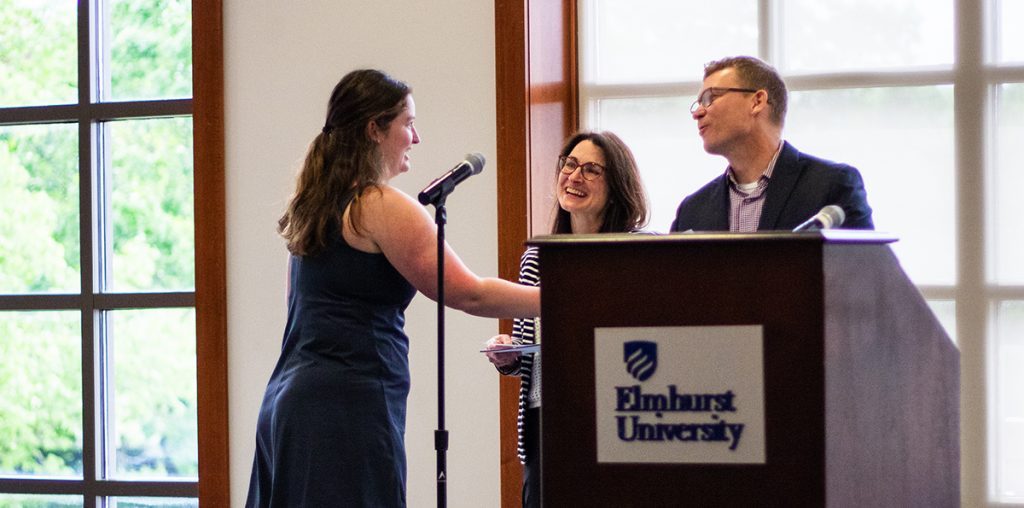BY Beverly Troiano |
5 MIN READ

When I started at Elmhurst in 2013, my goal was to develop an ESL (English as a Second Language)/bilingual endorsement program that integrated action research as a form of professional development.
During my doctoral studies, I taught teachers how to use action research to study their classrooms of multilingual learners; teachers initiated and directed action research projects to improve their teaching and students’ learning. Action research, as a form of professional development, is a part of a larger movement to counteract the de-professionalization of K-12 educators, which is often defined by prescriptive approaches to teaching and learning (Sagor, 2009).
In designing the endorsement program, I integrated a year-long action research course into the TEL minor and the endorsement program. Teacher candidates and practicing teachers conduct action research in their own classrooms as part of the course. The teachers are mentored into the systematic inquiry process of asking questions, collecting and analyzing data and taking action or making change in their classrooms, schools and communities.
I realized early on, however, that although they identified the action research course as important to their professional growth, and teacher candidates seldom continued to conduct research after they graduated. Schools and districts didn’t encourage nor support this type of professional development either.
To help teachers make action research part of their teaching practice, I needed to create a network to ensure teachers had the support they need during all steps of the research process.
An Action Research Network is Born
The Teacher Research Network became a reality in 2018. That year, Michael Meadows (SEC Math EDU, 2016) helped create the EC Teacher Research Network as a Facebook Group to support alumni’s desire to continue their action research work after graduating. This had nearly eighty alumni participated in the Facebook Group, with seven presenting at national and state professional conferences. However, Facebook as a platform was not meeting our growing interests.
Research I conducted in 2021 provided evidence of the efficacy of action research in ESL and bilingual classrooms. It also showed that teachers working with multilingual students shared a wide range of common interests and concerns across the Network. Key among them was the desire to find colleagues who share a common interest in reflecting on practice.
The findings suggested that a digital platform could support teacher retention and their sense of efficacy, while also the platform could provide a virtual space for teachers to share what they have learned and to hear what other teachers are doing.
In 2023-2024, Dr. Simeon Stumme (Education), Dr. Dean Jensen (Computer Science), and I received an imagining Elmhurst Innovation grant to create that digital space for education graduates. We unveiled that space—the Virtual Teacher Researcher Network—in Spring 2024. The website is the next stage of the Network and the most visible representation of what it does.
What is the Research Network
The website will extend the outreach of the Network by increasing research opportunities and the professional development of our alumni. The website will serve four purposes:
- It allows alumni and faculty to create a supportive professional community of teacher-researchers, with the ability to share materials of all types, including digital.
- It provides a digital library of completed Action Research projects, accessible to all members of the Network, with featured work available for public view.
- It is the hub for our annual conference. This year we held our first annual digital conference where undergraduates, graduates and alumni shared findings from their action research projects.
- It is a social space for alumni to connect and form support and working groups.
For Elmhurst alumni, this past year we offered two 12-week professional development sessions: one in the fall and one in the spring.
Six alumni participated: Lily Valazquez Silva (ECE, 2015), Michael Meadows (SEC Math EDU, 2016), Marjeta Bejdo (EYC, 2017), Esther Pereira (ELM, 2018), Niki Neuman (EYC, 2019), and Jenny Pina (ELM, 2020).
The Network brought these graduates together, many of whom didn’t know one another and some of whom have moved across the country to support their day-to-day classroom teaching. As Marjeta, one of the participating teachers, said: “Action research is so much easier to do when you are part of a group. Teachers want a safe place to share ideas and receive and give feedback.”
Niki Neuman, another teacher, said she would not have done action research without the Network’s support. The group allowed her the space to bounce ideas off each other and grow her undergraduate research project on fostering students’ funds of knowledge into a full-blown curriculum where families regularly sign up to share their cultural and linguistic practices in her first-grade classroom in Reno, NV.
This year, we also provided our TEL minor undergraduates a mentor teacher researcher during student teaching. Marjeta Bejdo was the first of what we hope are many mentors. Exemplary undergraduates action research projects were recognized at our first annual Multilingual Teacher Researcher Conference in May 2024.
What is Next for Action Research
The Network provides grass-roots professional development, with relationship building at the center of what it does. The value and importance of these types of relationship was instilled in me my mentor and friend, Dr. Aria Razfar, when I was a doctoral student at UIC. My hope is that the Network will continue to grow and connect alumni with teachers and scholars both nationally and internationally, broadening the opportunities for meaningful professional engagement for years to come.
To learn more about the Education Masters programs at Elmhurst University please visit our website.

